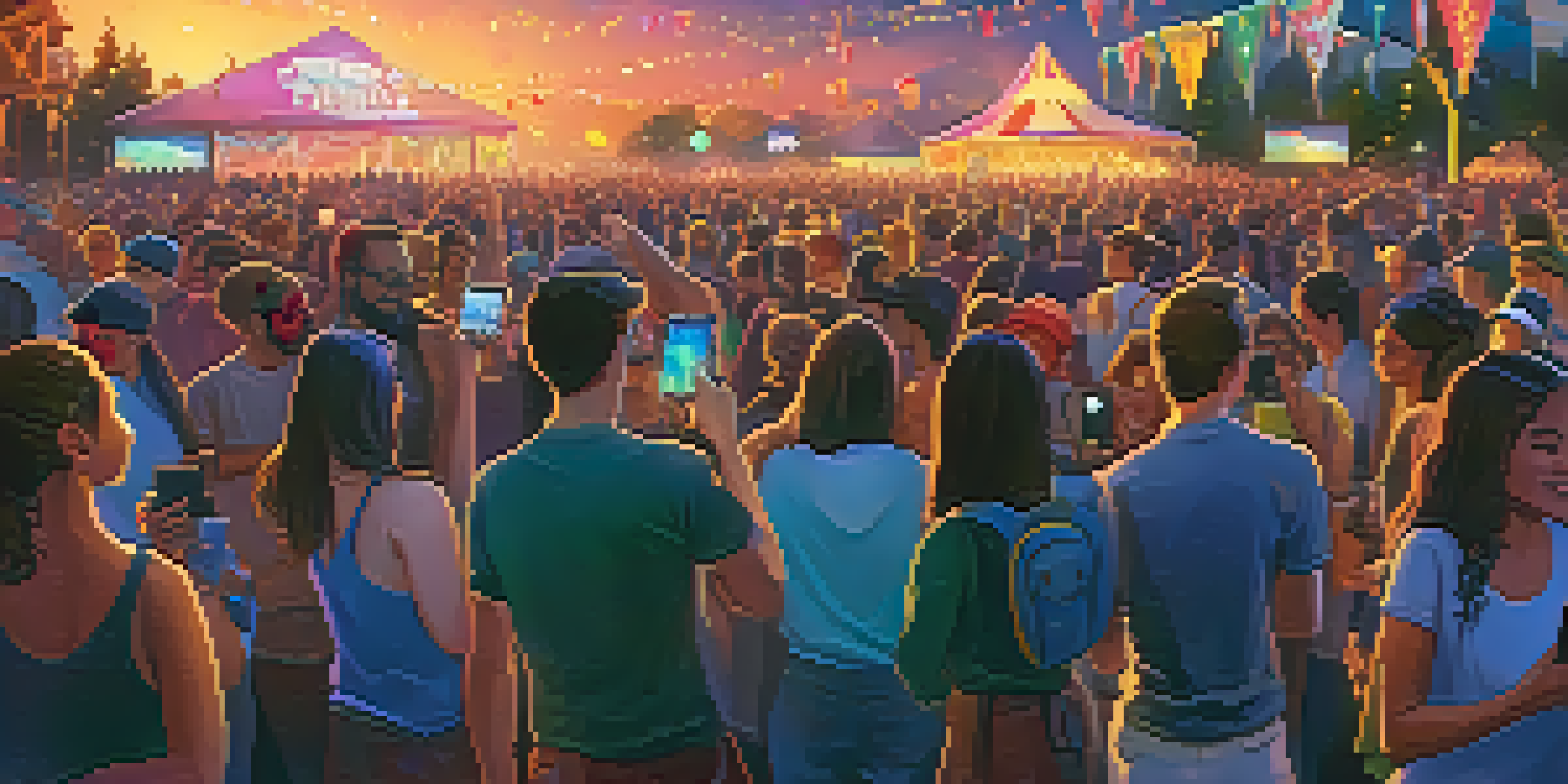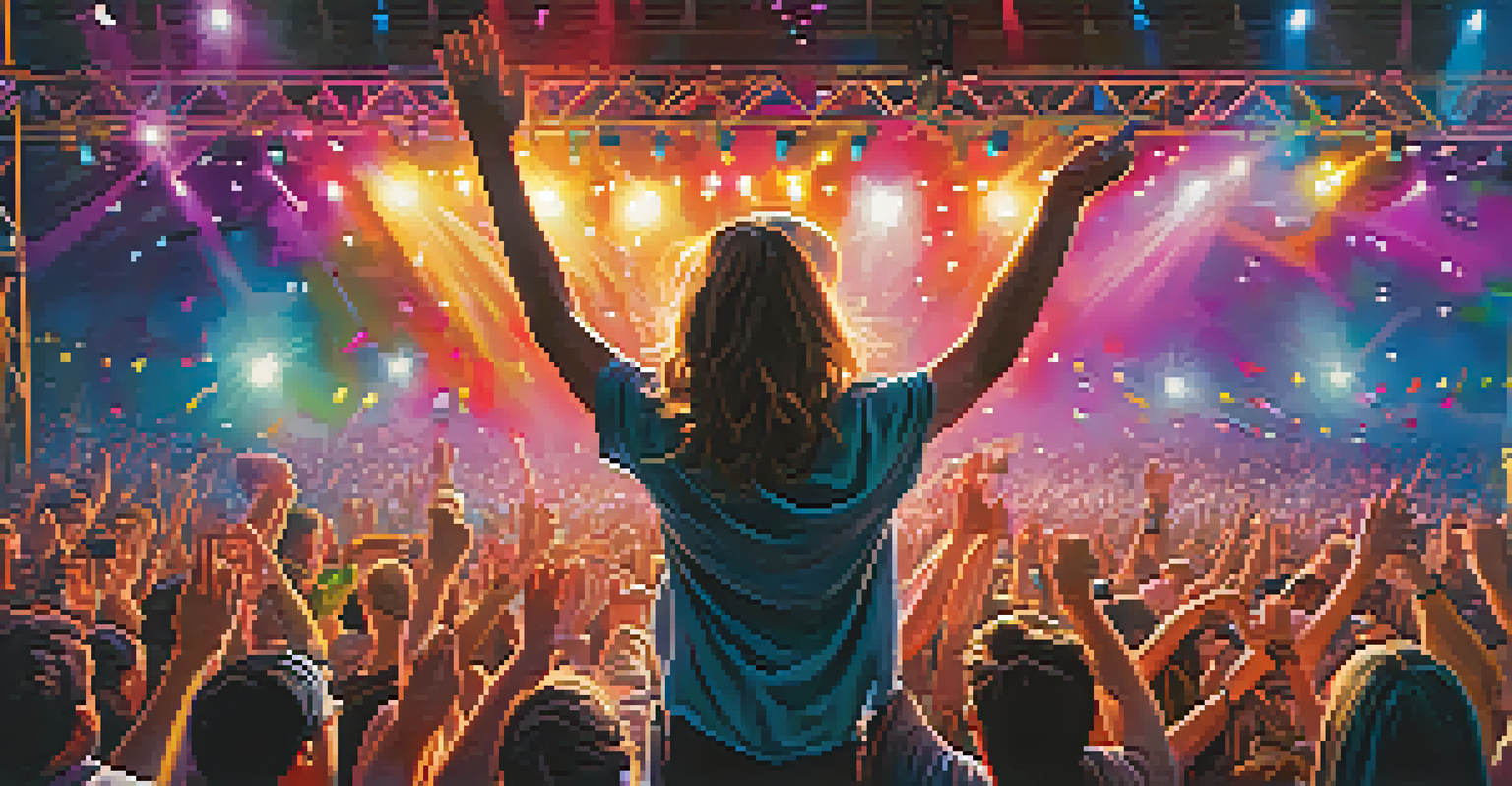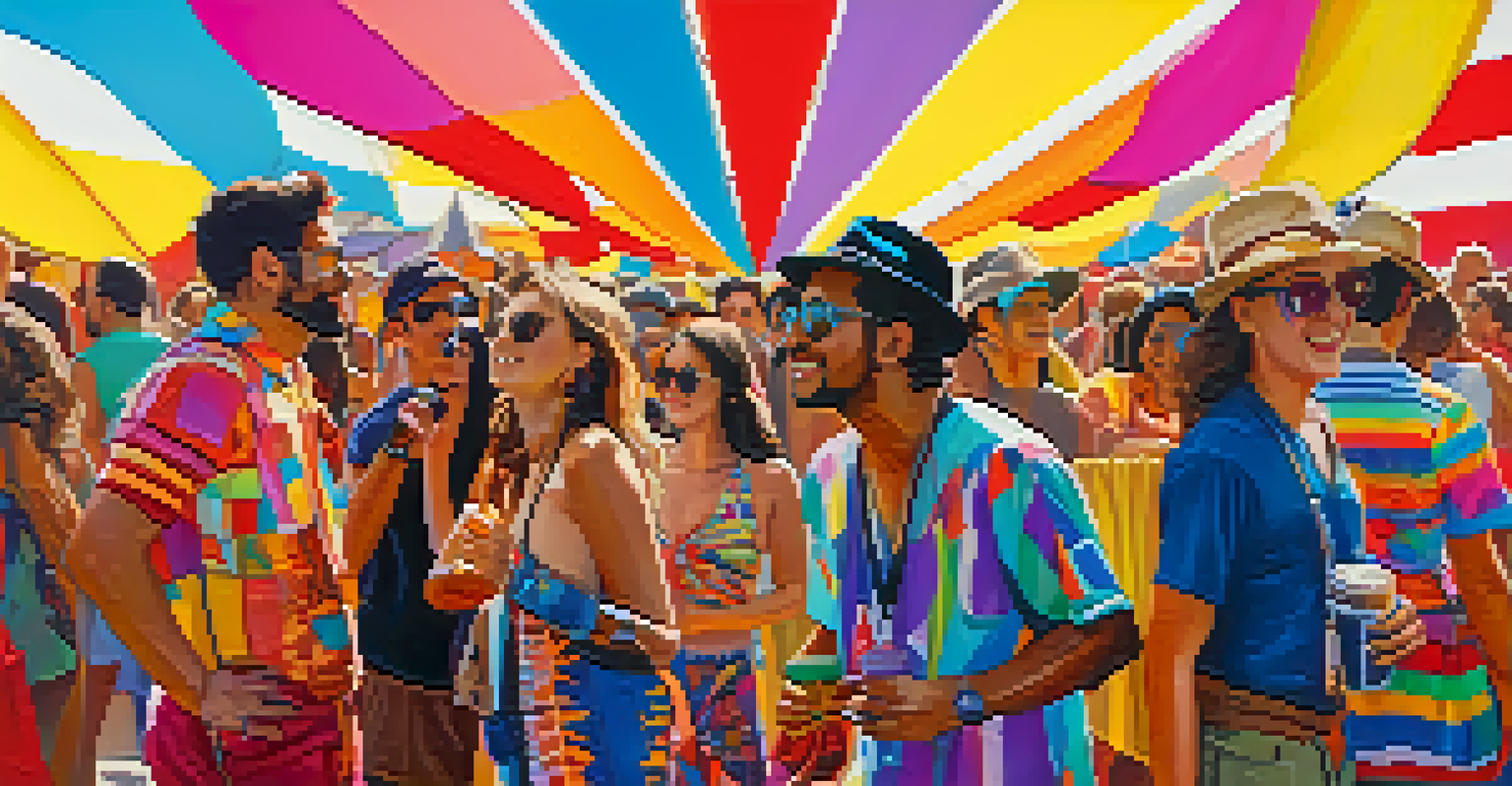The Impact of Music Festivals on Artist Promotion

Music Festivals as Launchpads for Emerging Artists
Music festivals have become vital platforms for new artists to showcase their talent. These events gather diverse crowds, providing a unique opportunity for fresh sounds to be heard. For many emerging musicians, performing at a festival can significantly elevate their profile, leading to increased followers and streaming numbers.
Music is a world within itself; it's a language we all understand.
Take, for instance, a band that plays at a local festival. The exposure to thousands of potential fans can be a game-changer, often resulting in new fans discovering their music online. This organic word-of-mouth promotion can be more effective than traditional advertising methods.
Moreover, the festival atmosphere fosters a sense of community, encouraging attendees to share experiences on social media. This sharing not only promotes the artists but also creates a buzz around the festival itself, making it a win-win situation for both.
Networking Opportunities for Artists and Industry Professionals
Music festivals serve as melting pots for artists, industry professionals, and fans alike. This environment allows musicians to network with producers, promoters, and other artists, which can lead to collaborations and new opportunities. It's not uncommon for an artist to secure a record deal simply by making the right connections at a festival.

For example, a singer-songwriter might meet a music manager while performing a set, leading to a discussion about future projects. This serendipitous networking can open doors that would otherwise remain closed. The informal nature of festivals makes it easier for artists to engage with industry players without the pressure often found in formal settings.
Festivals Boost Artist Visibility
Music festivals provide emerging artists with exposure to large audiences, leading to increased followers and streaming numbers.
Additionally, these interactions can lead to mentorship opportunities, where established artists offer guidance to newcomers. Such relationships can be invaluable, helping emerging talents navigate the complexities of the music industry.
Building a Loyal Fanbase Through Live Performances
Live performances are crucial for artists looking to build a loyal fanbase, and music festivals provide the perfect stage. The energy of a live crowd can create memorable experiences that resonate with attendees long after the event is over. When fans feel a connection during a performance, they are more likely to support the artist in the future.
The best way to predict the future is to create it.
Consider a scenario where an artist captivates the audience with an engaging set. Fans who enjoy the performance often purchase merchandise, follow the artist on social media, and stream their music afterward. This instant feedback loop is vital for artists seeking to establish a strong presence.
Moreover, the festival setting allows artists to showcase their personality and musical style in a way that recorded music cannot. This authenticity helps forge a deeper bond with fans, encouraging them to become ambassadors for the artist's brand.
Leveraging Social Media for Festival Promotion
In today's digital age, social media plays a pivotal role in promoting music festivals and the artists involved. Festivals often use platforms like Instagram and Twitter to create excitement leading up to the event, showcasing artist lineups and behind-the-scenes content. This buzz can significantly enhance an artist's visibility before they even take the stage.
Artists can also capitalize on this momentum by sharing their festival experiences online. Posting live clips or engaging with fans in real-time can amplify their reach and create a sense of connection with audiences who couldn't attend. This strategy not only promotes their music but also builds anticipation for future performances.
Networking Opens New Opportunities
Festivals create networking opportunities for artists and industry professionals, often resulting in valuable collaborations and mentorship.
Furthermore, the viral nature of social media means that standout performances can gain traction quickly. A single viral clip can introduce an artist to thousands of new listeners, further underscoring the importance of festivals in an artist's promotional toolkit.
The Role of Sponsorships in Artist Promotion
Sponsorships play a crucial role in music festivals, often leading to enhanced promotional opportunities for participating artists. Brands looking to connect with music fans frequently sponsor festivals, and this partnership can help elevate an artist's profile. Through these collaborations, artists gain access to wider marketing channels that can boost their visibility.
For instance, an artist performing at a sponsored stage may receive additional promotional support through the brand's marketing efforts. This could include social media shout-outs, featured content on the sponsor's website, or even inclusion in promotional materials. Such exposure can introduce the artist to new audiences who may not have discovered them otherwise.
Additionally, these sponsorships can lead to financial support for artists, allowing them to invest in their music and brand. This financial backing can be crucial for emerging artists who are still establishing themselves in the industry.
Creating Unique Experiences to Engage Fans
Music festivals are not just about the music; they are about creating unique experiences that resonate with fans. Artists who embrace this idea often find innovative ways to engage with their audience, making their performances memorable. Whether it's through elaborate stage designs, interactive elements, or surprise guest appearances, these experiences can leave lasting impressions.
For example, an artist might invite fans on stage to sing along during a popular song, creating an unforgettable moment for everyone involved. This kind of interaction fosters a sense of belonging among fans, encouraging them to share their experiences online and advocate for the artist.
Long-Term Benefits from Participation
Consistent participation in music festivals can lead to long-term career growth and a stronger brand identity for artists.
Moreover, as festivals increasingly incorporate technology, artists can leverage tools like live streaming and augmented reality to enhance fan engagement. These innovations not only make performances more exciting but also broaden their reach, allowing fans from around the world to participate.
The Long-Term Benefits of Festival Participation
Participating in music festivals can yield long-term benefits for artists that extend beyond immediate exposure. Many artists find that their careers flourish after a successful festival appearance, often leading to more gig opportunities and increased demand for their music. This momentum can be critical in helping them transition from local favorites to national or even international acts.
Moreover, consistent participation in festivals can help artists establish their brand identity. As they perform at various events, they build a reputation that can attract attention from media outlets, leading to interviews and features that further elevate their profile.

Ultimately, the relationships formed and experiences gained at festivals can shape an artist's career trajectory. The connections made and lessons learned can provide invaluable insights that inform future creative endeavors and promotional strategies.
Measuring the Impact of Festivals on Artist Success
Measuring the impact of music festivals on artist promotion can be complex, yet it’s essential for understanding their value. Metrics such as social media engagement, streaming numbers, and merchandise sales can provide insight into how a festival appearance influences an artist's popularity. By tracking these indicators, artists and their teams can assess the effectiveness of their festival strategy.
For example, an artist might notice a spike in streaming after a festival performance, indicating that their presence resonated with the audience. This data can inform future decisions regarding which festivals to prioritize and how to tailor their performances for maximum impact.
Furthermore, festivals themselves often collect data to analyze the success of their events. This information can help artists understand which festivals attract their target audience, enabling them to make more informed choices about where to perform next.